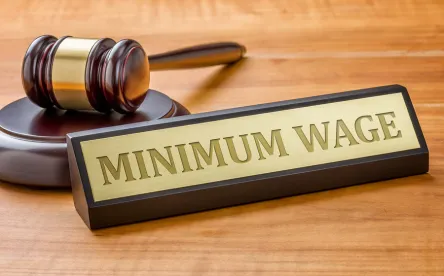The Lifting Up Illinois Working Families Act amends the Illinois Minimum Wage Law (IMWL) to raise the state minimum wage in stages until it reaches $15.00 per hour. While the amendments’ increases to the minimum wage have received significant coverage, some of the most important changes to the IMWL should not be overlooked by employers. The Act also raises the damages available to employees for violations of the IMWL and allows the state labor department to conduct random audits.
Rate Increases
The amendments to the IMWL, signed into law on February 19, 2019, by Governor J.B. Pritzker, will increase the minimum wage in stages.
Effective January 1, 2020, the minimum wage will increase to $9.25 per hour. Six months later, on July 1, 2020, the minimum wage will increase to $10.00 per hour. Thereafter, the minimum wage will increase by $1.00 per hour effective January 1 of each year until the minimum wage reaches $15.00 per hour on January 1, 2025.
These minimum wage increases are applicable to employees 18 years of age or older. They also apply to employees under 18 years of age who have worked more than 650 hours for the employer during any calendar year. Employees under 18 years of age who have not worked more than 650 hours in a calendar year will be entitled to a lower minimum wage, which will be capped at $13.00 per hour on January 1, 2025.
Damages
The IMWL amendments also include steep increases in the damages that can be recovered by employees for violations of the IMWL. These include not only violations for not paying the required minimum wage but also include much more common violations related to the proper payment of overtime compensation.
Prior to the amendments, an aggrieved employee could recover the amount of any underpayment plus damages of 2% of the amount of the underpayment for each month that the underpayment remains unpaid. For example, if an employee did not receive an overtime payment in the amount of $100 that was due 3 years ago, the employee could receive a total of $172, i.e., the $100 that was owed plus damages in the amount of $72 (36 months x 2% x $100).
Under the amended IMWL, an aggrieved employee may recover triple the amount of the underpayment plus 5% of the amount of the underpayment for each month that the underpayment remains unpaid. Using the above example, the same employee can recover a total of $480, i.e., $300 (three times the $100 that was owed) plus damages in the amount of $180 (36 months x 5% x $100).
Moreover, because the IMWL in many ways mirrors the protections afforded employees under the federal Fair Labor Standards Act (FLSA), an aggrieved employee likely would be entitled to recover additional liquidated damages equal to the amount of the underpayment. For example, under the scenario above, the employee could recover an additional $100 on top of the $480 payable under the IMWL.
On an individual basis, the increases in recoverable damages may not appear extreme. However, many (if not most) IMWL cases are prosecuted on a class-wide basis on behalf of dozens, hundreds, or even thousands of employees. Further, many cases prosecuted under the IMWL (and FLSA) do not involve clear violations of the law. Instead, they are disputes over opaque or highly technical areas of wage-and-hour law, such as whether salaried employees are properly classified as exempt from the overtime requirements of the IMWL and FLSA. The cost of resolving such class claims through settlement — even where liability is not clear-cut — therefore has increased dramatically.
Random Audits
Additionally, the IMWL amendments have given authority to the Illinois Department of Labor (IDOL) to conduct random audits of employers to ensure compliance with the law.
The Act also increased the penalties that the IDOL can recover for violations. The IDOL may recover from employers a penalty of $100 per impacted employee for failures to maintain proper payroll records, and the penalty for failures to properly pay minimum wage or overtime has been increased to include a $1,500 penalty on top of the prior penalty of up to 20% of the total underpayment.
Implications
In light of these amendments to the IMWL, employers operating within Illinois should consider the use of arbitration agreements with class action waivers to minimize the risk of class claims under the IMWL, particularly in industries most at risk for wage law class actions. Employers also should consider a self-audit of their wage-and-hour practices to ensure that their payroll and timekeeping practices are compliant with Illinois and federal law.



 />i
/>i

